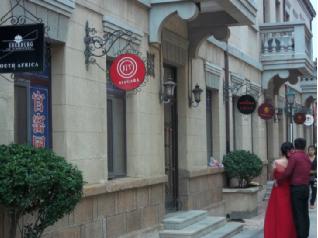Government Investment, Civil Servants and Hospitality in China
Date£º
2014-04-16 13:59 Source£º
http://wineeconomist.com Author:
Cynthia Howson, Pierre Ly and Jeff Begun Translator:
We were lucky to spend a month last summer traveling through several Chinese wine regions, meeting producers, farmers, and experts, and tasting some truly delicious wines.
In the last post, we talked about the diversity of Chinese terroir and how the distinctive features of each region might be developed. It¡¯s no secret that the government is a major player in the Chinese economy and wine is no exception. Each winery we encountered depends on some form of support or relationship with local government officials, usually at the local level (town, county or prefecture). And each wine producing region has a provincial government that is committed to upgrading in some way, but the issues they face and the resources they can provide vastly different.

In this photo, a couple poses at the ¡°World Wine Walk¡±, a street in Yantai, Shandong, where city has built a beautiful space to highlight the wine industry. Presumably, wine shops or other stores will fill the vacant spaces, but for now, it is just a very pretty place to walk near the beach and restaurants.
The State as Public Investor, Institutional Facilitator and Quality Control Monitor
Crucial government support can come in the form of investment, cheap credit, infrastructure or institutional support, like facilitating contracts or coordinating farmers. Each of these is critical and is likely to affect the types of wineries that will be most successful in each region. For some wineries, relationships with farmers require careful, daily supervision. In one case, the village head provides much of the human resource management for a winery, coordinating day laborers and making sure the vineyard has the right workers at the right time. Elsewhere, a manager for a large corporate winery said it¡¯s not so much about financial support as good policy, helping to coordinate with banks and institutions. ¡°They don¡¯t interfere,¡± he said.
In Ningxia, local governments encourage new wineries by providing electricity, irrigation, pavement, signs on the road, subsidies for imported vines and even funds to invite foreign consultants and prizes for award-winning wineries. In Shandong, local governments coordinate lease agreements with farmers so that a winery can establish a single vineyard and control its grapes even if dozens of different farmers control the small plots of land.
Interestingly, the role of government as regulator came up less frequently in our discussions, but it is one of critical determinants of a successful wine industry. Pollution, pesticides and food safety are all critical features of a healthy vineyard and are very sensitive topics in China. Indeed, a 2012 scandal over contaminated wine stoked concerns about the largest producers and whether food safety inspectors should become stricter about pesticides. We took this photo of a pesticide-laden cluster at a major state-owned winery (although this may be just a very large demonstration vineyard).

Needless to say, this is not what the grapes looked like in most of the vineyards we visited, including those of small farmers. However, several wineries expressed concerns about producers using pesticides that are banned in China (where regulations are already looser than in Western countries). This is a particular concern in Shandong, where humidity is most threatening and where, it¡¯s worth noting, some farmers are hesitant to eat the skins of their own grapes. Here, efforts to tighten enforcement of environmental regulations could be facilitated by ongoing efforts to promote agribusiness over more diverse types of wineries.
Another Public Investment: Government as Customer
The most successful wineries benefit from government contracts for banquets and from civil servants as high end customers. Those sought after consumers are not just wine drinkers, of course, but collectors, and most importantly, those who purchase wine as gifts. It¡¯s no secret that gifts are an important part of business negotiations in China. Some experts have pointed out that a market for extremely expensive Chinese wine has benefited from civil servants and business magnates who are looking for an appropriately priced gift. Such a gift need not be consumed. At other times, negotiations might involve fancy banquets or informal meetings, where the spirit of friendship is facilitated by a meal and a bottle. Indeed, most people we spoke with emphasized food and drink as part of maintaining good relationships with local officials.
But conventional wisdom has it that civil servants have seen their belts tighten, a trend that the new President, Xi Jinping, is eager to continue. The national government has made some public efforts toward curbing corruption in addition to increasingly strict monitoring of accounts. Of course, careful control of public expenditure sounds great to a political economist, so we were surprised when even a taxi driver called it a ¡°disaster.¡± The ¡°disaster,¡± we are told, is that when civil servants are constricted in their use of expense accounts, the entire hospitality industry is affected, including hotels, bars, restaurants, taxi drivers, and of course, wineries. Now, it¡¯s important to keep in mind that our informal conversations are just that. We can¡¯t say whether civil servants have actually changed their spending habits or if, for example, announcements in the media have stoked the rumor mill, but we did find it curious to encounter the same perspective from very different people in the hospitality industry and to note that it was echoed by Beijing Boyce. We asked a driver in Shanxi province whether he sees a lot of tourists and he explained how changes in government spending have hurt the tourism industry. We discussed the prices of Chinese wine with a foreign barrel merchant in Shandong province and he explained how changes in civil servants¡¯ accounts are crushing the market for low quality, expensive gift wines.
If our barrel merchant and others are correct, there may be important changes in Chinese supermarkets. If wine drinkers seek out higher quality at the same time as consumers limit their purchase of exorbitantly price gift wines, we might start to see some of the delicious wines we tasted taking up more space at the supermarket. Actually, we are pretty optimistic that those delicious wines are coming regardless of civil servants¡¯ expense accounts.